The Works of William Law (9 vols.)
Digital Logos Edition
Overview
What does it mean to have serious faith? From the time he was a boy, William Law attempted to make his commitment to Christ real in all aspects of his life. He felt strongly that one’s commitment to God took precedence over all competing commitments. Law lived this out, willingly giving up his fellowship at Cambridge rather than breaking an oath. Both in person and through his written works, Law had a major influence on John and Charles Wesley.
The Works of William Law contains all of Law’s writings, as well as his letters. Research Law’s influence on Wesley by examining their works side by side. Get definitions for obscure English words using the dictionary lookup tool. See Scripture references on mouseover. Get near-instant search results using Logos’ powerful search tools.

- Biographical sketch of William Law
- Law’s most influential devotional and mystical writings
- Law’s famous three letters to the bishop of Bangor
- Title: Works of William Law
- Author: William Law
- Publisher: J. Richardson
- Volumes: 9
- Pages: 2,076
- The Works of the Reverend William Law, vol. 1
- The Works of the Reverend William Law, vol. 2
- The Works of the Reverend William Law, vol. 3
- The Works of the Reverend William Law, vol. 4
- The Works of the Reverend William Law, vol. 5
- The Works of the Reverend William Law, vol. 6
- The Works of the Reverend William Law, vol. 7
- The Works of the Reverend William Law, vol. 8
- The Works of the Reverend William Law, vol. 9
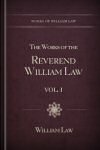
Volume one contains Law’s three letters to the bishop of Bangor.
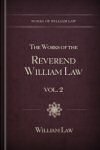
Volume two contains: “Remarks upon a Late Book Entitled The Fable of the Bees,” “The Case of Reason, or Natural Religion Fairly and Fully Stated,” and “The Absolute Unlawfulness of Stage Entertainments Fully Demonstrated.”
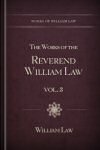
Volume three contains: “A Practical Treatise upon Christian Perfection.”
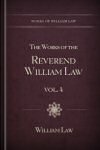
Volume four contains A Serious Call to a Devout and Holy Life.
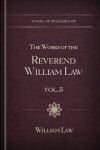
Volume five contains “A Demonstration of the Gross and Fundamental Errors of a Late Book, called A Plain Account of the Sacrament of the Lord’s Supper” and “The Grounds and Reason of Christian Regeneration.”
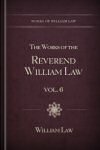
Volume six contains “An Earnest and Serious Answer to Dr. Trapp’s Discourse on the Folly, Sin and Danger of Being Righteous Over-Much” and “An Appeal to All That Doubt or Disbelieve the Truths of the Gospel.”
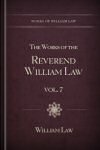
Volume seven contains “The Spirit of Prayer: Or the Soul Rising Out of the Vanity of Time into the Riches of Eternity” in two parts and “The Way to Divine Knowledge; Being Several Dialogues between Humanus, Academicus, Rusticus, and Theophilus.”

Volume eight contains “The Spirit of Love” in two parts and “A Short but Sufficient Confutation of the Rev. Dr. Warburton’s Projected Defence of Christianity.”
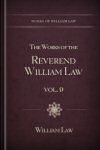
Volume nine contains “Of Justification by Faith and Works,” “An Humble, Earnest, and Affectionate Address to the Clergy,” and “A Collection of Letters on the Most Interesting and Important Subjects.”
William Law (1686–1761) was born in Kings Cliffe, Northamptonshire, England. He attended Cambridge in 1705 and was elected a fellow of Emmanuel College in 1711; he was ordained the same year. Upon the accession of George I, Law refused to take the oath of allegiance and became a non-juror (one who would not abjure the Stuart line and submit to the House of Hanover). He lost his fellowship at Emmanuel College and took up work tutoring Edward Gibbon. He lived with the Gibbons for more than 10 years, acting as a spiritual guide to the family. While there, he offered guidance and counsel to a number of prominent Christians, including John Wesley and Charles Wesley.
Reviews
8 ratings

Kevin Bratcher
6/12/2018
AeliusCicero
6/19/2014
Dennis Pulley
4/17/2014

Allen Bingham
4/7/2014

Larry Proffitt (I
11/5/2013

Douglas J. Klinsing
8/1/2013

Dan Learned
7/14/2013

Bill Shewmaker
7/13/2013
